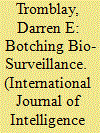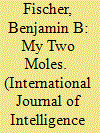|
|
|
Sort Order |
|
|
|
Items / Page
|
|
|
|
|
|
|
| Srl | Item |
| 1 |
ID:
188266


|
|
|
|
|
| Summary/Abstract |
Frederick Rutland’s intelligence activities in interwar Los Angeles have been the subject of much analysis since the war. Interpretations range from the assertion of his biographer that he did essentially nothing illegal to the more recent claim that the technical information he provided to the Imperial Navy helped make the Pearl Harbor attack possible. This article uses recently declassified American documents and Japanese sources to shed new light on Rutland’s activities, his role in the wider Japanese intelligence apparatus, and the nature of his mission. Contra most previous analyses, these suggest that the Japanese Navy viewed Rutland as an agent with future potential for wartime rather than one who had already provided valuable services. Those included creating close relationships with high-profile Americans to get strategic information rather than technical intelligence. They also suggest that the Japanese Navy’s skewed view of Rutland prevented it from developing a more effective prewar intelligence network, with dire consequences.
|
|
|
|
|
|
|
|
|
|
|
|
|
|
|
|
| 2 |
ID:
188272


|
|
|
|
|
| Summary/Abstract |
The global COVID-19 pandemic was an intelligence failure, with a death toll orders of magnitude greater than the 11 September 2001 (9/11) attacks on the United States. Multiple factors—of both political and policy natures—contributed to the catastrophe. One area that warrants scrutiny is the United States’ capability for bio-surveillance: identifying the presence of a pathogen before it can take hold within a population. Since 2003, the Department of Homeland Security (DHS) has had a responsibility for one line of defense against biological disasters and yet has stumbled toward implementing that defense, while promising a sense of security that it cannot deliver.
|
|
|
|
|
|
|
|
|
|
|
|
|
|
|
|
| 3 |
ID:
188268


|
|
|
|
|
| Summary/Abstract |
Between 2009 and 2011, there was an intense debate in UK, Canadian, and Australian military intelligence circles regarding two putatively competing doctrinal concepts, the U.S.-originated “intelligence, surveillance, and reconnaissance” and the United Kingdom’s “intelligence, surveillance, target acquisition, and reconnaissance.” The inclusion, or not, of target acquisition proved a flashpoint for a wider and deeper range of existing concerns about the organizational and doctrinal relationships between intelligence and operations in a military command staff. These, in turn, reflected a more fundamental and ongoing transformation in that relationship arising from “revolution in military affairs” during the 1990s. The article traces the debate up to its premature termination by fiat in 2011 and concludes that these issues remain to be properly addressed in UK and allied intelligence doctrine.
|
|
|
|
|
|
|
|
|
|
|
|
|
|
|
|
| 4 |
ID:
188271


|
|
|
|
|
| Summary/Abstract |
During my career, I had the dubious experience of crossing paths with the two most notorious foreign intelligence penetrations (“moles”) of the U.S. Intelligence Community (IC) during and after the Cold War: Central Intelligence Agency (CIA) officer Aldrich (Rick) Ames and Federal Bureau of Investigation (FBI) agent Robert Hanssen.
|
|
|
|
|
|
|
|
|
|
|
|
|
|
|
|
| 5 |
ID:
188270


|
|
|
|
|
| Summary/Abstract |
There are various dimensions of the COVID-19 warning problem. For example, how did the scientific, intelligence, and strategic studies communities issue accurate diffuse warnings of the growing risk of a global pandemic? This raises the possibility that the warnings issued might have been misleading because they focus on the disease’s details and not on the second- and third-order effects that would significantly impede national and global responses to coronavirus. The pandemic outbreak also led to the acceleration of ongoing work in the pharmaceutical industry, producing “game-changing” medical advances that might soon be replicated in other fields. It may be time to develop a specialized organization—a warning “skunkworks”—whose sole mission is to identify and assess the impact of novel developments in both domestic and international settings.
|
|
|
|
|
|
|
|
|
|
|
|
|
|
|
|
| 6 |
ID:
188269


|
|
|
|
|
| Summary/Abstract |
A model suggests that Schelling salience through social traplike processes can generate dysfunctional organizational mindsets that increase the likelihood of intelligence failure. Schelling salience refers to how certain aspects can spontaneously and tacitly become collectively cognitively prominent, and thus, coordinate behavior. Short-term benefits of a predominant mindset may generate long-term biases in analysis, collection, and decisionmakers’ responsiveness. Strong mindsets do not inevitably generate intelligence failures. However, a particular organizational state, referred to as a “pleasant attractor,” where sustained strategies produce satisficing outcomes and alternative strategies are more uncertain and/or costly, is conducive to biased mindsets causing intelligence failures. Findings from an examination of nineteen historical cases of intelligence failures and successes, with an emphasis on four sequences of cases with an initial intelligence failure, supported the model.
|
|
|
|
|
|
|
|
|
|
|
|
|
|
|
|
| 7 |
ID:
188265


|
|
|
|
|
| Summary/Abstract |
After the Bolsheviks consolidated their newly won power, they looked toward the Western democracies to achieve additional victories. Under cover of diplomatic recognition, trade agreements, and local communist parties, Soviets sent numerous clandestine agents abroad to pursue national security objectives, including theft of military and industrial secrets on a large scale. France, Britain, and the United States were the main targets in which, organizationally, Soviet intelligence used a consistent pattern. As an existential threat, France was the first priority until displaced by the fear of German rearmament. France represented a rich resource for advanced military and industrial technology that the Soviets needed to transform Russia’s infrastructure. In 1935, France and Russia signed a mutual defense pact that effectively ended Soviet espionage in France.
|
|
|
|
|
|
|
|
|
|
|
|
|
|
|
|
| 8 |
ID:
188267


|
|
|
|
|
| Summary/Abstract |
Strategic analysts and planners need distinct capabilities to include extensive disciplinary expertise and a broad understanding of the world and methodological expertise for dealing with innovation, discovery, and surprise. Specifically, the analyst needs to evaluate the robustness of a policy to the uncertainty of an assessment. The analyst must have both topical expertise in the disciplines underlying the analysis, as well as decision-theoretic expertise in managing uncertainty. This is demonstrated by applying info-gap decision theory and the concept of robust-satisficing to the analysis of policy in response to al-Qaeda prior to 11 September 2001, which illustrates the combination of topical and decision-theoretic expertise.
|
|
|
|
|
|
|
|
|
|
|
|
|
|
|
|
|
|
|
|
|